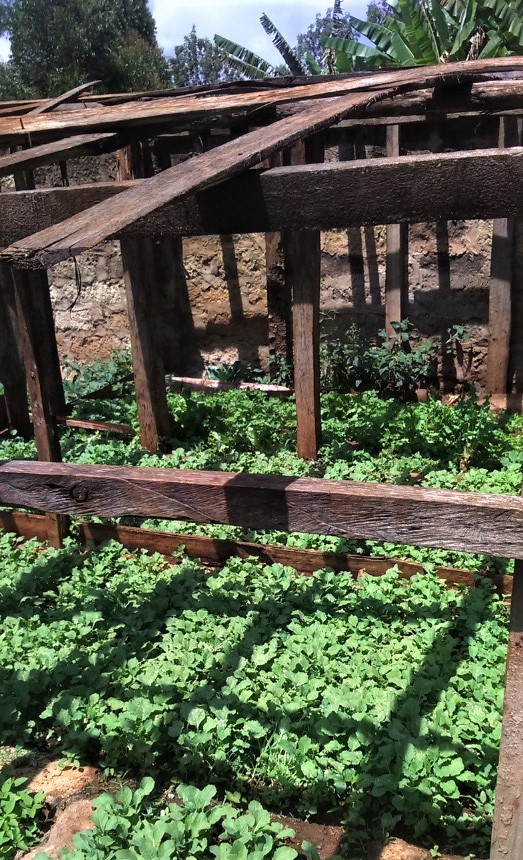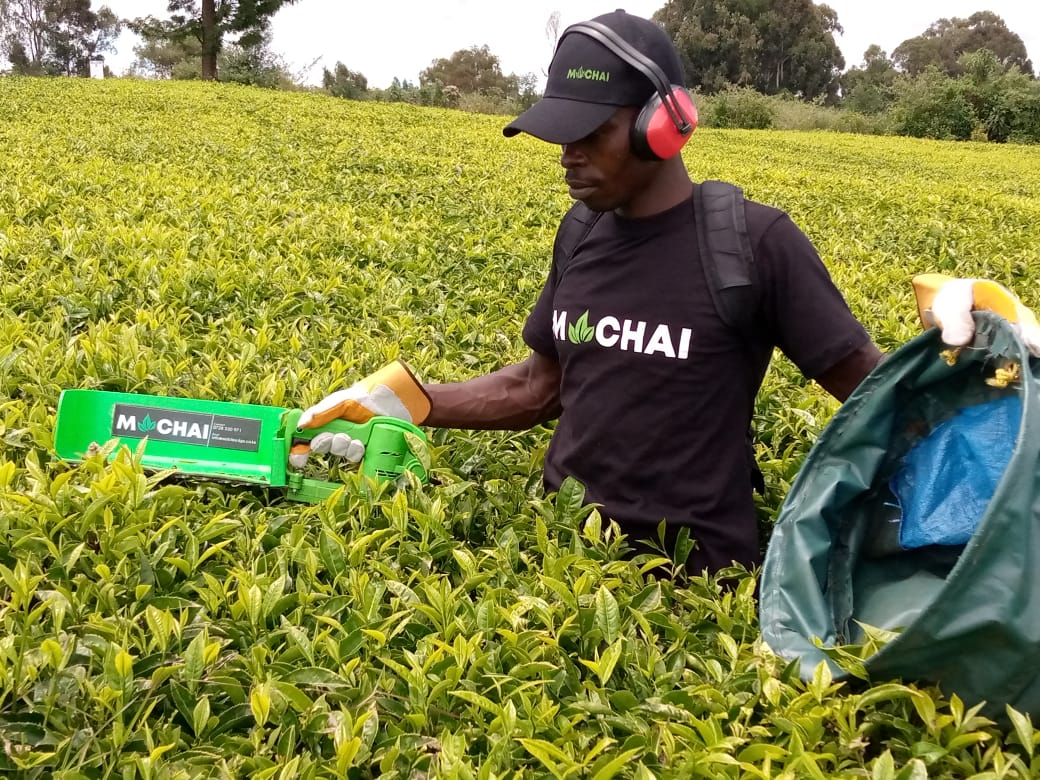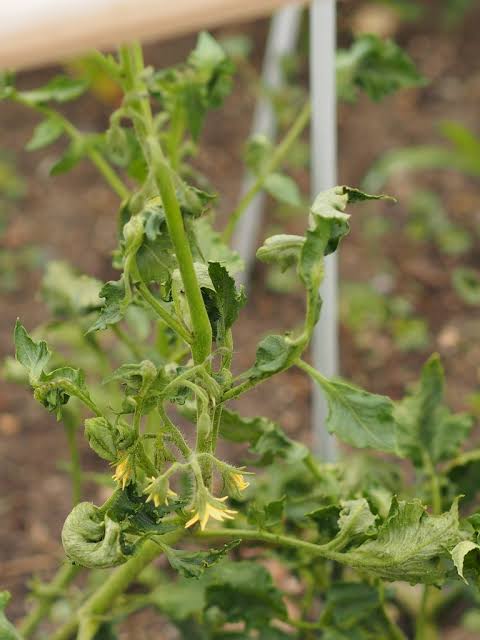 By George Munene
By George Munene
When I meet Mr Kirimi at his Kaaga home he has a phone in hand finalising the sale of 50kg of sukuma wiki. This will happen intermittently over the course of our conversation, he warns, for around these parts, anyone looking to buy horticultural products knows just who to call.
For Patrick Kirimi has created a model in mixed farming on the acre at his home and his three-acre farm at Giaki, using most of his land to grow his most lucrative crop of tomatoes, but, bearing in mind their price volatility, ensuring he has a solid income of some Sh100,000 a month from an acre that he splits between kale and capsicums.
He grows the sukuma wiki on a 3/4 acre plot in front of his home. This year, he bought 20,000 seeds of the Mfalme F1 brand at Sh2500 for 100 grams. This is expensive, he says, as other brands sell for Sh300. But the extra investment is worth it, as his customers prefer this type of kale, which doesn't cause heartburn as other kales do.
Related News: How a former P1 teacher built a mixed farm empire in Kisumu from Sh4,000 capital
He transplants the sukuma from his nursery, plants them at 2*1 feet spacing, applies DAP fertiliser and manure, and is ready for harvesting to begin in around six weeks. At one month, he applies CAN fertiliser, and then, once ready, keeps plucking away at a single crop for over a year.
His overall cost of production ranges from Sh70,000 to Sh90,000 a month, made up of around Sh25,000 in labour costs, to which he adds the costs of crop replenishment and pest control, and the rest goes on manure, costing Sh35,000 for every lorry.
Kirimi has a steady water supply from the river beside the path to his home.
For pest control, the most common pests affecting his sukumas are aphids, whiteflies and caterpillars. For every section of sukuma he harvests, he'll spray it for pests. He also does this whenever there's a disease outbreak, which he says is rare.
He harvests about 150-200kg of kale daily which he currently sells at Sh30 per kilogram, totalling between Sh4,500 and Sh6,000 a day.
Opting to plant kale was a strategic choice, says Kirimi. The crop has multiple benefits: it isn't prone to pests and diseases, generates relatively low maintenance costs, and enjoys high demand throughout the year, meaning he clears some Sh60,000 to Sh80,000 a month from the crop.
Being close to social institutions - his home borders a church, there schools in the vicinity, KEMU's main campus is only walking distance away, there are hotels about, and Meru town is just 2 km away - he never wants for customers.
His main crop, however, is tomatoes, which he grows in an open field of three acres at Giaki prepared by tractor and casual labourers. He tells me that he leaves his land bare for one to two months after the initial till to expose weeds and parasites to scorching. He then transplants the seedlings from his nursery after three to four weeks, planting them at 3*3 feet in spacing and adds a teaspoon of DPP fertiliser for every hole.
He waters his plants every morning and evening in the initial two weeks, then four times a week dependent on the weather. On the fourth week he top dresses his crop using CAN fertiliser.
The most prevalent tomato pests he says are Cat Worms, which he treats with the pesticide Thunder. Cold is treated by Rindomill,TIHAN,Victory or any other dethane
Related News: Maize feed mixed with lupin seeds increases milk yields and cuts production costs
Tomatoes are fed on foliar feeds such as Waxol every two weeks to enhance crop growth.
Two months after the crop begins to flower, Kirimi uses insecticides to avoid the flower and the newly natured fruit being eaten. After three months, the crop is nearly ready for harvest and he is careful to use only recommended mild sprays.
The downside to tomatoes is that their market prices are highly volatile. A kilogram of tomato can sell for as little as 20 shillings - making it difficult for a farmer to break even and Kirimi confesses to having been burnt a couple of times. But this year is proving exceptional.
He has planted twelve thousand seedlings of the Hybrid F1 and Sarah F1 variety on two acres, from which he expects to harvest 25-35 tonnes per acre. But tomato prices have soared lately to over Sh100 a kilo, generating a potential revenue of many millions for Kirimi across the season, before costs.
“Tomato prices are really hard to predict,” he said.
For this reason, Kirimi then further spreads his risk and business by growing ¼ acre of capsicums at his home with 1,000 seedlings of the Continental hybrid F1 and California Wonder varieties. From these, he harvests 200-300kgs every two weeks, which he sells locally at Sh100 per kilo, geernating revenue of around Sh50,000 a month at peak.
In his experience, the price varies from Sh50 to Sh250, peaking over the holiday periods, but tends to run at about Sh100 until about April.
In terms of land use, he advises, capsicums should not succeed tomatoes over a planting season, as, being members of the same family, they share similar diseases.
The most devastating pest that affects the Solanaceae family (tomatoes & capsicum) in his experience is the Tuta absoluta. It is highly communicable and destructive, in severe cases it requires uprooting the whole of the affected crop.
In all, Kirimi is, these days, an expert, well versed on every minute detail of crop production after two decades in agribusiness. His expertise ahs paid off too, generating proceeds that have allowed him diversify into other fields such as transportation, although he's now planning on divest himself of the other daily operations in order to focus solely on agribusiness.
He is now planning to create four fully operational greenhouses by the end of 2020. Twenty years in, and many millions better off, there is a sense he's only just getting started.
"Agriculture has been good to me,” he said, as he bangs on his metallic lorry bed fitting. “There are few professions one can get to do that they enjoy and earn a good living off it too."
Patrick Kirimi can be reached through:07170770686






 By George Munene
By George Munene










